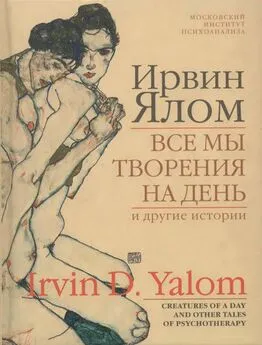Ирвин Ялом - The Schopenhauer Cure
- Название:The Schopenhauer Cure
- Автор:
- Жанр:
- Издательство:неизвестно
- Год:неизвестен
- ISBN:нет данных
- Рейтинг:
- Избранное:Добавить в избранное
-
Отзывы:
-
Ваша оценка:
Ирвин Ялом - The Schopenhauer Cure краткое содержание
The Schopenhauer Cure - читать онлайн бесплатно полную версию (весь текст целиком)
Интервал:
Закладка:
I was able to live fully, harmoniously—that was when I could connect with the great
minds of the past.»
«I remember you and your Aristarchus and Zeno.»
«Yes, those and many others since, but the respites, the compulsion–free times,
were all too brief. Now I`m liberated. Now I dwell in a higher realm all the time. But let
me continue to review my therapy with you. Isn`t that your primary request?»
Julius nodded.
«I remember being very attached to our therapy. It became another compulsion, but
unfortunately it didn`t replace the sexual compulsion but merely coexisted with it. I
remember anticipating each hour with eagerness and yet ending with disappointment. It`s
difficult to remember much of what we did—I think we strove to understand my
compulsion from the standpoint of my life history. Figuring it out—we always tried to
figure it out. Yet every solution seemed suspect to me. No hypothesis was well–argued or
well–grounded, and, worse, not one had the slightest impact on my compulsion.
«And itwas a compulsion. I knew that. And I knew that I had to stop cold turkey. It
took me a long time, but eventually I realized you didn`t know how to help me and I lost
faith in our work together. I recall that you spent inordinate amounts of time exploring
my relationships—with others and especially with you. That never made sense to me. It
didn`t then. It still doesn`t. As time went by, it became painful to meet with you, painful
to keep on exploring our relationship as though it were real or enduring or anything other
than what it truly was:a purchase of service. ” Philip stopped and looked at Julius with
his palms up as though to say, «You wanted it straight—there it is.»
Julius was stunned. Someone else`s voice answered for him: «That`s straight, all
right. Thanks, Philip. Now, the rest of your story. What`s happened to you since?»
Philip placed his palms together, rested his chin on his fingertips, stared up at the
ceiling to collect his thoughts, and continued. «Well, let`s see. I`ll start with work. My
expertise in developing hormonal agents to block insect reproduction had important
implications for the company, and my salary escalated. But I grew profoundly bored with
chemistry. Then, at age thirty, one of my father`s trust funds matured and was turned over
to me. It was a gift of freedom. I had enough to live on for several years, and I canceled
my subscriptions to the chemistry journals, dropped out of the work force, and turned my
attention to what I really wanted in life—the pursuit of wisdom.
«I was still miserable, still anxious, still sexually driven. I tried other therapists, but
none helped me any more than you had. One therapist, who had studied with Jung,
suggested I needed more than psychological therapy. He said that for an addict like me
the best hope for release was a spiritual conversion. His suggestion led me to religious
philosophy—especially the ideas and practices of the Far East—they were the only ones
that made any sense. All other religious systems failed to explore the fundamental
philosophical questions but instead used God as a method of avoiding true philosophical
analysis. I even put in a few weeks at meditation retreats. That was not without interest. It
didn`t halt the obsession, but nonetheless I had a feeling that there was something
important there. I just wasn`t yet ready for it.
«Meanwhile, except for the interlude of forced chastity in the ashram, and even
there I managed to find a few sliding doors, I continued the sexual hunt. As before, I had
sex with a lot of women, by the dozens, by the hundreds. Sometimes two a day,
anywhere, anytime I could find them—the same as when I was seeing you. Sex once,
occasionally twice, with a woman and then moving on. Never exciting after that; you
know the old saying: вЂYou can only have sex for the first time with the same girl once.`”
Philip lifted his chin from his fingertips and turned to Julius.
«That last comment was meant to be humor, Dr. Hertzfeld. I remember you once
said it was remarkable that, in all our hours together, I never once told you a joke.»
Julius, now in no mood for levity, forced his lips into a grin even though he
recognized Philip`s little bon mot as something he himself had once said to Philip. Julius
imagined Philip as a mechanical doll with a large key jutting from the top of his head.
Time to wind him up again. «And then what happened?»
Gazing at the ceiling, Philip continued. «Then one day I reached a momentous
decision. Since no therapist had helped in any way—and, sorry to say, Dr. Hertzfeld, that
included you—”
«I`m beginning to get that particular point,” Julius interjected, then quickly added,
«No apologies needed. You`re simply answering my questions honestly.»
«Sorry, didn`t mean to dwell on that. To continue, since therapy had not been the
answer, I decided to heal myself—a course of bibliotherapy, assimilating the relevant
thoughts of the wisest men whoever lived. So I began systematically reading the entire
corpus of philosophy starting with the Greek pre–Socratics and working my way up to
Popper, Rawls, and Quine. After a year of study my compulsion was no better, but I
arrived at some important decisions: namely, that I was on the right track and that
philosophy was my home. This was a major step—I remember how much you and I had
talked about my never being at home anywhere in the world.»
Julius nodded. «Yes, I remember that, too.»
«I decided that, as long as I was going to spend years reading philosophy, I might
as well make a profession of it. My money wouldn`t last forever. So I entered the Ph.D.
program in philosophy at Columbia. I did well, wrote a competent dissertation, and five
years later had a doctorate in philosophy. I embarked on a teaching career and then, just a
couple of years ago, became interested in applied or, as I prefer to think of it, вЂclinical
philosophy.` And that brings me up to today.»
«You haven`t finished telling me about being healed.»
«Well, at Columbia, midway through my reading, I developed a relationship with a
therapist, the perfect therapist, the therapist who offered me what no one else had been
able to give.»
«In New York, eh? What was his name? At Columbia? What institute did he
belong to?»
«His name was Arthur...” Philip paused and watched Julius with a trace of a grin
on his lips.
«Arthur?»
«Yes, Arthur Schopenhauer, my therapist.»
«Schopenhauer? You`re putting me on, Philip.»
«I`ve never been more serious.»
«I know little about Schopenhauer: just the clichГ©s about his gloomy pessimism.
I`ve never heard his name mentioned in the context of therapy. How was he able to help?
What—?»
«I hate to cut you off, Dr. Hertzfeld, but I have a client coming and I still refuse to
be late—that hasn`t changed. Please give me your card. Some other time I`ll tell you
more about him. He was the therapist meant for me. I don`t exaggerate when I say I owe
my life to the genius of Arthur Schopenhauer.»
4
1787—The
Genius: Stormy
Beginning
and False Start
_________________________
Talentis like a marksman who
hits a target which others
cannot reach; genius is like a
marksman who hits a target
which others cannot see.
_________________________
Stormy Beginning—The genius was only four inches long when the storms began. In
September of 1787 his enveloping amniotic sea roiled, tossed him to and fro, and
threatened his fragile attachment to the uterine shore. The sea waters reeked of anger and
fear. The sour chemicals of nostalgia and despair enveloped him. Gone forever were
sweet balmy bobbing days. With nowhere to turn and no hope of comfort, his tiny neural
synapses flared and fired in all directions.
What is young–learned is best–learned. Arthur Schopenhauer never forgot his early
lessons.
False Start (or How Arthur Schopenhauer almost became an Englishman)—Arthurrr.
Arthurrr, Arthurrrr. Heinrich Florio Schopenhauer scratched each syllable with his
tongue. Arthur—a good name, an excellent name for the future head of the great
Schopenhauer mercantile house.
It was 1787, and his young wife, Johanna, was two months pregnant when
Heinrich Schopenhauer made a decision: if he had a son, he would name him Arthur. An
honorable man, Heinrich allowed nothing to take precedence over duty. Just as his
ancestors had passed the stewardship of the great Schopenhauer mercantile house to him,
he would pass it to his son. These were perilous times, but Heinrich was confident that
his yet unborn son would guide the firm into the nineteenth century. Arthur was the
perfect name for the position. It was a name spelled the same in all major European
languages, a name which would slip gracefully through all national borders. But, most
important of all, it was an English name!
For centuries Heinrich`s ancestors had guided the Schopenhauer business with
great diligence and success. Heinrich`s grandfather once hosted Catherine the Great of
Russia and, to ensure her comfort, ordered brandy to be poured over the floors of the
guest quarters and then set afire to leave the rooms dry and aromatic. Heinrich`s father
had been visited by Frederick, the king of Prussia, who spent hours attempting,
unsuccessfully, to persuade him to shift the company from Danzig to Prussia. And now
the stewardship of the great merchant house had passed to Heinrich, who was convinced
that a Schopenhauer bearing the name of Arthur would lead the firm into a brilliant
future.
The Schopenhauer mercantile house, dealing in the trade of grains, timber, and
coffee, had long been one of the leading firms of Danzig, that venerable Hanseatic city
which had long dominated the Baltic trade. But bad times had come for the grand free
city. With Prussia menacing in the west and Russia in the east, and with a weakened
Poland no longer able to continue guaranteeing Danzig`s sovereignty, Heinrich
Schopenhauer had no doubt that Danzig`s days of freedom and trading stability were
coming to an end. All of Europe was awash in political and financial turmoil—save
England. England was the rock. England was the future. The Schopenhauer firm and
family would find safe haven in England. No, more than safe haven, it would prosper if
its future head should be born an Englishman and bear an English name. Herr Arthurrr
Schopenhauer, no—Mister Arthurrr Schopenhauer—an English subject heading the firm:
that was the ticket to the future.
So, paying no heed to the protests of his teenaged pregnant wife, who pleaded to be
in her mother`s calming presence for the birth of her first child, he set off, wife in tow,
for the long trip to England. The young Johanna was aghast but had to submit to the
unbending will of her husband. Once settled in London, however, Johanna`s ebullient
spirit returned and her charm soon captivated London society. She wrote in her travel
journal that her new English loving friends offered comforting reassurance and that
before long she was the center of much attention.
Читать дальшеИнтервал:
Закладка:









